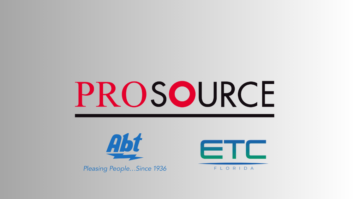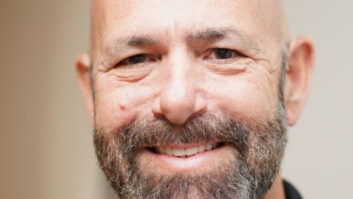INDIANAPOLIS –
The definition what a buying
group is in today’s CE industry is changing as the
industry evolves.
That was the message that came out of a discussion
between the media and ProSource executives
had during the group’s reception during CEDIA Expo.
ProSource, BrandSource’s CE division, is made
up of the Progressive Retailers Organization (PRO
Group) and Home Entertainment Source, so Jim Ristow,
executive VP of CE at BrandSource, and Dave
Workman, executive director of PRO Group, have
observed the changes for years.
Ristow commented, “We are no longer a ‘buying
group’ traditionally. That definition needs to change
drastically.”
For instance, Workman said that his organization’s
reaction to the new BrandSource app “has been very
positive. This is proof positive that what we have been
doing to leverage the best of the both groups.”
Workman noted that buying groups have “always
been about programs, programs, programs … and
marketing. The world has changed, and we need to
change, look to find new solutions proactively. Logistics,
business model changes, forecasting — all that
plus advanced Internet tools, and make changes.”
Workman stressed, “You can’t program your way to
survival anymore to get an extra 2 percent [of profit]
for survival.”
Ristow added, “Different steps abound, involving e-tail, retail or maybe some sort of
blend” should be involved.
Regarding Internet operations, Workman
said that when it comes to his PRO
members, “No other buying group has
the core competency in Internet retailing
than ours. We have several retailers
in our group that are experts.”
When asked if an in-house brand may
be part of ProSource’s strategy down
the road, Workman said, “We had plenty
of discussions about it with members,
and we would like to work with our [supplier]
partners. We would like to work
with leading suppliers to come up with
special derivative lines exclusive to us
as opposed to our own private-label
lines. Most private labels are usually
low-end promotional items.”
Ristow noted that in TV at least, “They
are usually tier-three products, $20 to
$30 lower in price. The risks are price
and if the market changes the risks for
our members would be upside down”
since ProSource members might be at
risk for lower margins.
Workman pointed out, “At this point
Vizio in TVs are squeezed. How could
we do better with a house brand of TV
than Vizio? Our group wants to work
with our partners [on derivatives].”
Workman said that ProSource
wanted lower-priced HDMI cables and
worked with Monster Cable on an exclusive
line “that they built for us. Members
want us to back well-known brands.”
As for the Expert Warehouse II project,
the CE operation has begun, according
to Ristow, with shipments to
customers “coming soon … that is the
next step.”
In terms of ProSource’s relationships
with suppliers, Workman said
that some of its members want “fewer,
but stronger partners. That is what the
talk is. We need more help from stronger
partners is what they are saying.”
Ristow did add that ProSource’s Signature
program “will be stronger than
ever in 2012.” Workman noted that
members do want “a true, core partnership
with key vendors.”
In other areas, Ristow said that a
smartphone program via Expert Warehouse
II has not been set as yet, but
he acknowledged, “It is a high-volume
business-within-a-business.”
Workman also addressed the
20,000-pound gorilla in the TV business
— the pending introduction of Apple TV,
probably in 2012. He commented, “Apple
TV will change the user experience
when it comes out” and stressed, “You
must follow the breadcrumbs when it
comes to Apple.” Workman commented
that Apple is working with GameStop
and asked, “Will they have a game function
in their TV’s user interface? They will
want the IPTV experience to be seamless,
and have an easy user experience.
They probably think that today’s IPTV is
clunky. They think they can come in and
get a major share of the market.”













